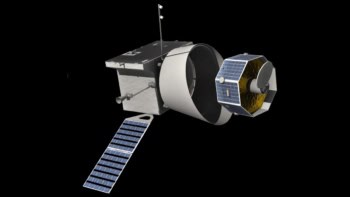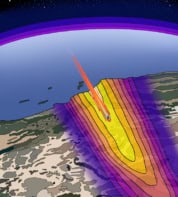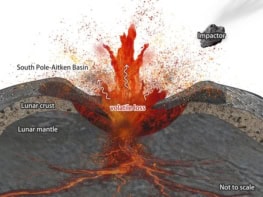Do you lie awake at night worrying that life on Earth might one day be destroyed by a blast of gamma radiation from space? Then don't, because a team of astronomers in the US has calculated that the probability of such an event occurring in our galaxy is virtually zero. Krzysztof Stanek and colleagues at Ohio State University say that gamma-ray bursts -- the most powerful explosions in the universe after the big bang -- only tend to occur in small, misshapen "metal-poor" galaxies. Our Milky Way is safe since it is a large spiral galaxy that contains lots of heavy elements (astro-ph/0604113).
Gamma-ray bursts (GRBs) are powerful explosions that release high-energy beams of radiation that shoot out across space. They occur quite rarely — about once every few years — and last for anything from one hundred seconds to just a few milliseconds. Astronomers now believe that “long” gamma-ray bursts — bursts that last more than two seconds — happen when a massive star undergoes a supernova explosion at the end of its life and collapses to form a black hole.
Scientists say that if a long GRB were to occur near our solar system, it would wipe out life on Earth. Some even believe that such a burst might have caused a mass extinction event on Earth some 450 million years ago. Now, Stanek and co-workers have found that GRBs only tend to occur in small, misshapen galaxies that lack “heavier” elements beyond hydrogen, helium and lithium (known collectively in astrophysics as “metals”).
The Ohio astronomers came to this conclusion by statistically analysing four GRBs that occurred in nearby galaxies. The team compared the mass of the four galaxies, the rate at which new stars were forming in them, and how much metal they have compared to other galaxies catalogued in the “Sloan Digital Sky Survey”. All four galaxies, they found, were small with high rates of star formation and low metal content.
Stanek and colleagues discovered that the galaxy with the most metals — and therefore the one most similar to our own Milky Way — hosted the weakest GRBs. They calculated that the probability of a GRB occurring in this galaxy was just 0.15%. And since our galaxy contains twice as much metal as this galaxy, the odds of a GRB happening here are even lower. According to the team, the Milky Way has been too metal-rich to host GRBs for at least the last several billion years, which means that these bursts could not have been responsible for mass extinctions on Earth.
The result also shows that GRBs do not pose a threat to anywhere in the universe where life might exist. This is because planets need metals to form and so would only be found in low-risk metal-rich galaxies like ours.



